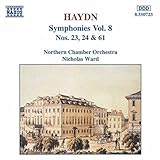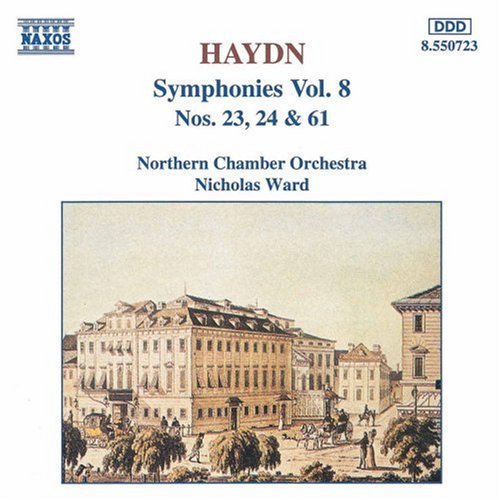Franz Joseph Haydn Album: «Sym 23/24/61»

- Customers rating: (5.0 of 5)
- Title:Sym 23/24/61
- Release date:1994-10-04
- Type:Audio CD
- Label:Naxos
- UPC:730099572323
- 1Sym No.24 in D: Allegro
- 2Sym No.24 in D: Adagio
- 3Sym No.24 in D: Menuet
- 4Sym No.24 in D: Finale: Allegro
- 5Sym No.23 in G: Allegro
- 6Sym No.23 in G: Andante
- 7Sym No.23 in G: Menuet
- 8Sym No.23 in G: Finale: Presto Assai
- 9Symphony No.61 in D: Vivace
- 10Symphony No.61 in D: Adagio
- 11Symphony No.61 in D: Menuet
- 12Symphony No.61 in D: Prestissimo
Judging from a number of their recordings, the Northern Chamber Orchestra out of Manchester, England, is a remarkable ensemble. Their performances of these symphonies is first-rate, with a great sense style, although they are by no means an 'original instruments' group. This orchestra does not seem to know how to play a dull note.
The disc starts with no. 24. The adagio second movement is virtually a miniature flute concerto, and a very beautiful one. Apparently Haydn had a very good flautist in his orchestra at Esterhazy, one Fritz Sigl. This steals the show.
These symphonies all follow a standard pattern, fast, slow, minuet, fast. Within this structure, however, all the movements are very different. One is continually amazed at Haydn's inventiveness. According to the liner notes, nos. 23 and 24 were written in 1764 for Prince Esterhazy, and they are superb examples of Haydn's earlier period.
No. 61, composed in 1776 is more sophisticated, although it seems to contain theatre music. Its Its slow second movement is again exceedingly beautiful, seeming to express some pathos, not a usual mood for Haydn. The graceful minuet and the lively and theatrical fourth movement prestissimo are much more cheerful.
Haydn wrote more good symphonies than anyone else, and these are all wonderfully inventive works.
The recording, done in the Concert Hall of the New Broadcasting House in Manchester, is very fine, with a nice ambience.
One of the amazing things about Haydn is that he could write so many pieces in one genre and make each one sound fresh and original. It's also amazing how many wonderful lesser known artists and ensembles Naxos ends up recording. I one of "those people" who prefers "original instruments" performances, but I have to say these performances on this disk by Nicholas Ward and the Northern Chamber Orchestra are excellent, lively and rhythmic. There's nothing lacking in the enthusiasm, technique and well thought out vision of the music these performers bring to these pieces. I'm pretty much a Haydn addict, if that counts for anything, and I enjoy this disk every time I listen, which is fairly often. My personal favorite is no. 23.
"Ours is the century of death and Mahler is its musical prophet." Thus croaked my spiritual advisor, Rabbi Moses Finkelstein. I hold him in the highest respect even if he is anathematised in certain circles because of his views on radical circumcision - and some stridently question his accreditation as a cleric per se. We were sitting on the balcony in a pub in Narooma overlooking the South West Pacific. The sky above was as cerulean as the sea. Lunch was on the way.
"I'm not sure it's apt to quote Lenny out here," I replied casually as a group of boys walked past with their fishing lines. A regatta was getting underway near the lighthouse on Montague Island. "Besides, we're in a new century now."
"Why you can't appreciate Mahler? What about his Third Symphony?"
"It's a work that threatens to collapse under the weight of its own pretensions - a bit like my reviews!"
Moses ignored the comment to reiterate its program:
"What the Flowers of the Meadow Tell Me; What the Animals in the Forest Tell Me; What Man Tells Me; What the Angels Tell Me; What Love Tells Me; What God tells me."
"It's all hokum," I said with a laugh. "Here's a better maxim: what Haydn tells me."
Thankfully our King George Whiting arrived at this point. We kept our peace until the plates were clean. Even the crumbs were swept up into the maelstrom.
"You cannot seriously rank Haydn on the same level as Mahler," Moses growled as we ordered desserts. I turned windward to face my old buddy, the sea.
"Not at all. I rank him much higher. Mind you, I am being archly subjective. Haydn was such a complete human being, not an agony-aunt like old Gustav. He is actually an antidote to Mahler. Here, I have a present for you."
I handed over a CD. It was a Naxos disc.
"Exhibit One: Nicholas Ward and the Northern Chamber Orchestra playing Symphonies 23, 24 and 61. There are no hammer-blows of fate here. If you are hooked on bloated rhetoric you'll walk away dejected. These are three perfectly conceived (and performed) symphonies from the Eighteenth Century. They're as blessed as golden apples from the Garden of Hesperides. Alas none of them has a moniker, otherwise they would be famous. Naxos has yet to provide us with a better disc. Nor is there any trace of Hogwoodism."
My friend read the notes as he listened on.
"Better still," I added, "the Adagio of 61 is a miracle. There is nothing like it in his other symphonies - the Oxford, perhaps, being the exception. It can only be likened to those other chimerical works that Haydn wrote in 1790 in wait to be released from Esterhaza (such as the Adagio from the B Minor quartet Opus 64/2). It is replete with sadness and yearning. The other two symphonies pre-date his Sturm und Drang period. They're also program works."
"Really, what do they say?"
"Enjoy life and don't rake over one's neuroses." I paused. "Who knows? Once you get into these works, my dear friend, you'll ditch that `Barnum & Bailey' Symphony of a Thousand quick-smart!"
We parted company. Soon afterwards, I caught up with Moses at the matzo balls factory. He looked a much happier man. There was a spring in his step. I did not need to ask why. Blessed be Haydn.

